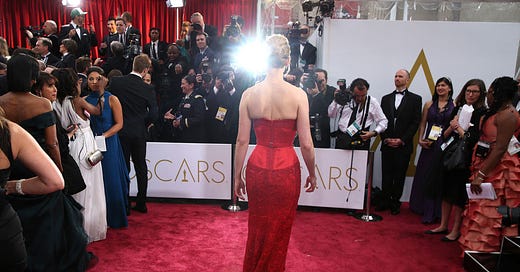They’re rolling out the red carpet for the BAFTAs as I type.
The ones who stand on the special carpet are separate, admirable, excused from contact with the pavement. And we like to look at them there, dressed beautifully, answering questions about their work, their outfit, whether they’re excited.
We want stars to gawp at and idolise. We want them to be ‘other’, special, exceptional. But does our need to see them as better mean we let them get away with murder?
“You can’t be in the entertainment business without working with big stars,” said Peter Fincham on a recent episode of The Media Club podcast.
If you want to understand what goes on behind the scenes in the industry, The Media Club is an always insightful, lively and informed listen. They’ve even had me on as a guest.
Have a look at this short clip.
“And big stars will not behave like other people,” he added. As a fact, not a problem to be solved, just the simple truth. They won’t.
Fincham is a well-respected and extremely experienced exec who has, in his time, run both ITV and the BBC. He knows whereof he speaks. But hidden between the lines of that very casual “stars will not behave like other people” is the source of one of the industry’s biggest problems: so many stars do behave badly.
If the public adores a particular celebrity (or at least the version they see on TV), that star becomes worth their weight in gold. Their agents can demand bigger fees, better treatment.
“Not another one,” some punters will exclaim when a famous person is outed as a bully, as though each one is an aberration, a terrific surprise. It shouldn’t be a surprise because that spoiled toddler behaviour is a symptom of the system. A system built on the backs of a few magical people who must be cajoled and flattered or they might just take their golden ass somewhere else.
“Big stars will not behave like other people.”
Does an awful temperament automatically go with being a creative? That’s a myth perpetuated by us, the media, just everyone, like “Boys will be boys”. Every adult human is responsible for their own behaviour, but not the famous ones. They can’t be held responsible because their minds are on famous things.
One thing is certain: no one makes it to the super league of fame without very sharp elbows. Yes, there’s often an overlap between people who fight their way towards fame and people who feel empty inside. But, whatever’s driving them, very famous people only seldom get there by just being good at their jobs and going with the flow. They make the right friends, ditch people who aren’t useful, barge their way to the front.
Everyone who has achieved status in the entertainment industry knows how to keep the wheels turning. Appeasement of the magical ones. Broadcasters must be able to attract the biggest names and hang onto them because they want those viewing figures.
And because there is no expectation for “big stars” to “behave”, they can often get away with bullying and abuse without ever having to face the consequences. In that clip, Fincham talks about Jeremy Clarkson and the BBC’s decision to fire him after he punched a producer.
When Fincham says they could have “found a way around it” because Clarkson was essentially too big a name to lose to a rival broadcaster, he isn’t wrong. Top Gear went from being the BBC’s biggest international seller to a comparative fart in the bath when Clarkson’s co-presenters followed him out of the door and towards a huge deal with Amazon Prime Video.
If the public tide does not turn against your magic person, even after negative publicity, then it’s in your best interests to keep them sweet, make the problem go away and resume your lucrative relationship.
“There’s no point saving an already drowned man.”
The times when that doesn’t happen, the audience has usually given the thumbs down, loudly on social media. There’s no point saving an already drowned man. See Phillip Schofield, Huw Edwards, et al.
I know so many creative people who make art and music and TV and films and podcasts and theatre. They’re not wildly famous or particularly rich. To my knowledge, none of them scream at runners or keep people waiting or insist on special treatment. They’re just glad to be working at a job they love.
Directly beneath the biggest stars in entertainment, there’s a whole layer of worker bees kept in a holding pattern of gratitude and sometimes criminally low pay, because they’re grateful to have a creative career at all.
Meanwhile, a firmament of arseholes twinkles overhead (OK, they’re not ALL arseholes), holding the industry to ransom and snorting up public approval through dusty nostrils.
I’m off to assemble a snack plate for the BAFTAs.





Although it'snot quite the same thing, I'm reminded o one off my very occasional brushes with the big and important. I was recently at a meal with someone "high up" in the world's largest and most profitable ex MP3 player-seller company. A meal where the steak was measured by cost not size. Having a perfe wectly pleasant evening, they were most anxious to discuss the men attempting to burn hotels with children in the lobby and how they were merely being patriotic. I won't bore you with the rest but I've not been invited to work with them since despite the success of the evening otherwise. Strange innit? Nobody speaks up because the rents got to be paid.